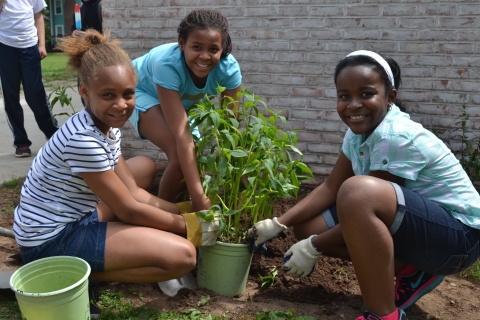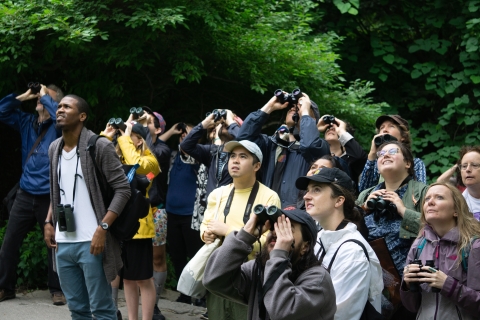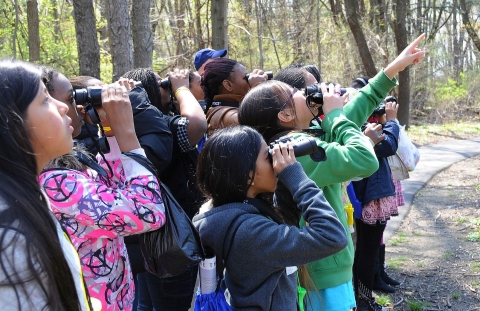This year the Service’s Urban Bird Treaty Program is funding 6 community-based conservation projects through its participation in the National Fish and Wildlife Foundation’s Five Star and Urban Waters Restoration Grant Program.
Every year, this program seeks to develop community stewardship of local natural resources in cities across the country to preserve these resources for future generations and enhance habitat for local wildlife by providing measurable and meaningful conservation and educational outcomes.
Partners in these projects are creating opportunities for people in diverse and under-resourced communities to engage in a wide range of activities-–to help make their urban areas healthier places for birds and people.
For the 2022 grant funding cycle, the Service’s Migratory Bird Program contributed funds for six partnership-based projects in Alaska, California, Connecticut, Hawaii, New York, and Rhode Island, with co-funding from the National Wildlife Refuge System, the U.S. Forest Service, and other non-federal NFWF 5 Star partners.
Below are the grantees and summaries of the 6 projects funded by the Migratory Bird Program’s Urban Bird Treaty Program:
Los Angeles Audubon Society, Los Angeles, CA: This project will engage approximately 2,400 youth from BIPOC (Black, Indigenous, and People of Color) communities and hundreds of community volunteers in education and habitat restoration. Students will gain knowledge about the Ballona Creek watershed through field trips, an after-school environmental leadership program, a youth summit, and hands-on restoration of 2 acres of coastal sage scrub habitat and 7.7 acres of beach habitat. The project will increase community access to nature, improve local watershed health, and benefit birds and other wildlife that use these habitats.
Groundwork Rhode Island, Providence, RI: This project will train 15 high school Green Team members to plant and water 200 trees and shrubs at 6-10 bird habitat demonstration sites totally 4 acres, in riverine Environmental Justice neighborhoods. Partners will develop a bird-friendly planting guide to be used in planting 2,000 additional trees in a companion restoration project with other public and private funding. Partners will also develop a curriculum for local schools on bird habitat in urban settings, lead 8 school field trips to demonstration sites with 150 students and 9 teachers, and coordinate 8 volunteer planting events with 150 volunteers. They will install and promote up to 10 educational signs at demonstration areas, and distribute an urban bird habitat and bird watching brochure to 1,000 residents hosting newly planted trees in their yards.
New York City Audubon, Inc., Bronx, NY: This project will restore and monitor 2.5 acres of upland and wet meadow in Van Cortlandt Park within the Harlem River watershed in the Bronx by engaging 120 volunteers and 20 youth interns. The project will engage over 100 volunteers in monitoring high-collision sites and deliver a bird-friendly building design course for 40 architects to reduce bird collisions with glass. Birdwatching opportunities will engage 90 elementary school students and 300 community members, fostering an interest in birds, nature, and conservation among diverse communities surrounding Van Cortlandt Park and throughout New York City.
The Service’s Urban Bird Treaty and National Wildlife Refuge System co-funded the following projects:
Alaska Geographic Association, Anchorage, AK: This project provides opportunities for Anchorage residents to become empowered stewards of local natural resources on and off-refuge through fishing, birdwatching, watershed education, and hands-on restoration projects. This project breaks down barriers for Anchorage’s diverse urban neighborhoods to access the waters that run right by their homes and schools while also helping address priority habitat restoration issues within the city limits.
National Audubon Society, Inc., New Haven, CT:This project will employ under-resourced youth as native plant propagators to grow and distribute hardy native plants to four low-income, high-need neighborhoods in New Haven, Connecticut. This project will particularly benefit neotropical migratory songbird species that rely on urban habitats during migration by creating or enhancing six acres of native plantings.
North Shore Community Land Trust, Honolulu, HI: This project entails removal of invasive vegetation over 12.7 acres, which will result in 4.9 acres of open pond habitat, 3.2 acres of native vegetation, 9.3 acres of pasture, and 1.4 acres of open space in the historic Kalou Fishpond, the last undeveloped space in the north shore. This work will create suitable habitat for five species of native waterbirds, including Hawaiian Duck, Hawaiian Stilt, and Hawaiian Coot, mitigate stormwater runoff, and engage a diverse cross section of the community that has strong cultural ties to the area.








